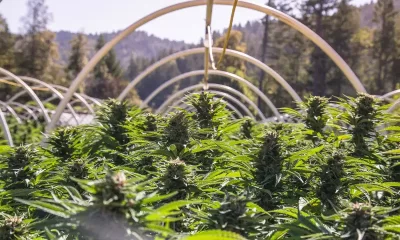Business
Argentina Launches New Agency To Boost Cannabis Industry

The agency hopes to make Argentina a leading global exporter of medicinal weed.
Argentina officially launched a new government agency on Wednesday as part of an effort to bolster the country’s medical marijuana and hemp industry.
Reuters reports that the agency, known as the Regulatory Agency for the Hemp and Medicinal Cannabis Industry, or ARICCAME, represents “the first working group of a new national agency to regularize and promote the country’s nascent cannabis industry, which ministers hope will create new jobs and exports generating fresh income for the South American nation.”
“This opens the door for Argentina to start a new path in terms of industrial exports, on the basis of huge global demand,” said Argentina’s economy minister Sergio Massa at an event marking the launch of the new agency.
According to Reuters, “Massa said that the agency would from Thursday begin regularizing programs and coordinating with various provinces and [the] industrial sector, adding Argentina already counted on demand for projects linked to the agro-industrial sector.”
On the official website for ARICCAME, the agency outlines its mission and objectives.
“We are the Agency that regulates the import, export, cultivation, industrial production, manufacture, commercialization and acquisition, by any title, of seeds of the cannabis plant, cannabis and its derivative products for medicinal or industrial purposes,” the website reads, via an English translation.
The website lists the following “general objectives” for the agency: “Establish through the respective regulations, the regulatory framework for the entire production chain and national marketing and/or export of the Cannabis Sativa L. plant, seeds and derivatives for use in favor of health and industrial hemp; Promote a new agro-industrial productive sector for the commercial manufacture of medicines, phytotherapeutics, food and cosmetics for human use, medicines and food for veterinary use, as well as the different products made possible by industrial hemp; Generate the framework for the adaptation to the regulatory regime, of the cultivation and production of cannabis derivatives for use in existing health, guaranteeing the traceability and quality of the products in order to safeguard the right to health of the users of medical cannabis; Reintroduce hemp in Argentina and all its derivatives: food, construction materials, textile fiber, cellulose and bioplastics with low environmental impact; [and] Promote scientific research and sectoral technological progress, promoting favorable conditions for these existing industries in our country.”
ARICCAME’s specific objectives include: “Establish clear rules that provide legal certainty to the sector and encourage federal participation; Articulate through agreements and conventions with other State entities with intervention in the matter: INASE, SENASA, INTA, INTI, AFIP, INAES, BCRA, UIF, National Universities, etc; Determine the system of licenses and administrative authorizations for the productive chain; Generate quality standards that safeguard the right to health of users and consumers of cannabis/hemp products; [and] Control non-compliance with the regulatory regime.”
Argentine policymakers legalized cannabis oil for medical use in 2017. Three years later, the country legalized home cannabis cultivation for medical marijuana patients.
The launch of the new agency is part of a border effort by the Argentine government to continue to reform the medical cannabis program, something that the South American country identified as a priority last year.
According to Reuters, the newly launched agency will be helmed by Francisco Echarren, who “said the industry could generate thousands of new jobs, as well as create technological developments and new products for export.”
“We have a huge challenge ahead of us,” Echarren said, as quoted by Reuters, “not only getting a new industry on its feet, but giving millions of Argentines access to products that improve quality of life.”
Source: https://hightimes.com/news/argentina-launches-new-agency-to-boost-cannabis-industry/
Business
New Mexico cannabis operator fined, loses license for alleged BioTrack fraud

New Mexico regulators fined a cannabis operator nearly $300,000 and revoked its license after the company allegedly created fake reports in the state’s traceability software.
The New Mexico Cannabis Control Division (CCD) accused marijuana manufacturer and retailer Golden Roots of 11 violations, according to Albuquerque Business First.
Golden Roots operates the The Cannabis Revolution Dispensary.
The majority of the violations are related to the Albuquerque company’s improper use of BioTrack, which has been New Mexico’s track-and-trace vendor since 2015.
The CCD alleges Golden Roots reported marijuana production only two months after it had received its vertically integrated license, according to Albuquerque Business First.
Because cannabis takes longer than two months to be cultivated, the CCD was suspicious of the report.
After inspecting the company’s premises, the CCD alleged Golden Roots reported cultivation, transportation and sales in BioTrack but wasn’t able to provide officers who inspected the site evidence that the operator was cultivating cannabis.
In April, the CCD revoked Golden Roots’ license and issued a $10,000 fine, according to the news outlet.
The company requested a hearing, which the regulator scheduled for Sept. 1.
At the hearing, the CCD testified that the company’s dried-cannabis weights in BioTrack were suspicious because they didn’t seem to accurately reflect how much weight marijuana loses as it dries.
Company employees also poorly accounted for why they were making adjustments in the system of up to 24 pounds of cannabis, making comments such as “bad” or “mistake” in the software, Albuquerque Business First reported.
Golden Roots was fined $298,972.05 – the amount regulators allege the company made selling products that weren’t properly accounted for in BioTrack.
The CCD has been cracking down on cannabis operators accused of selling products procured from out-of-state or not grown legally:
- Regulators alleged in August that Albuquerque dispensary Sawmill Sweet Leaf sold out-of-state products and didn’t have a license for extraction.
- Paradise Exotics Distro lost its license in July after regulators alleged the company sold products made in California.
Golden Roots was the first alleged rulebreaker in New Mexico to be asked to pay a large fine.
Source: https://mjbizdaily.com/new-mexico-cannabis-operator-fined-loses-license-for-alleged-biotrack-fraud/
Business
Marijuana companies suing US attorney general in federal prohibition challenge

Four marijuana companies, including a multistate operator, have filed a lawsuit against U.S. Attorney General Merrick Garland in which they allege the federal MJ prohibition under the Controlled Substances Act is no longer constitutional.
According to the complaint, filed Thursday in U.S. District Court in Massachusetts, retailer Canna Provisions, Treevit delivery service CEO Gyasi Sellers, cultivator Wiseacre Farm and MSO Verano Holdings Corp. are all harmed by “the federal government’s unconstitutional ban on cultivating, manufacturing, distributing, or possessing intrastate marijuana.”
Verano is headquartered in Chicago but has operations in Massachusetts; the other three operators are based in Massachusetts.
The lawsuit seeks a ruling that the “Controlled Substances Act is unconstitutional as applied to the intrastate cultivation, manufacture, possession, and distribution of marijuana pursuant to state law.”
The companies want the case to go before the U.S. Supreme Court.
They hired prominent law firm Boies Schiller Flexner to represent them.
The New York-based firm’s principal is David Boies, whose former clients include Microsoft, former presidential candidate Al Gore and Elizabeth Holmes’ disgraced startup Theranos.
Similar challenges to the federal Controlled Substances Act (CSA) have failed.
One such challenge led to a landmark Supreme Court decision in 2005.
In Gonzalez vs. Raich, the highest court in the United States ruled in a 6-3 decision that the commerce clause of the U.S. Constitution gave Congress the power to outlaw marijuana federally, even though state laws allow the cultivation and sale of cannabis.
In the 18 years since that ruling, 23 states and the District of Columbia have legalized adult-use marijuana and the federal government has allowed a multibillion-dollar cannabis industry to thrive.
Since both Congress and the U.S. Department of Justice, currently headed by Garland, have declined to intervene in state-licensed marijuana markets, the key facts that led to the Supreme Court’s 2005 ruling “no longer apply,” Boies said in a statement Thursday.
“The Supreme Court has since made clear that the federal government lacks the authority to regulate purely intrastate commerce,” Boies said.
“Moreover, the facts on which those precedents are based are no longer true.”
Verano President Darren Weiss said in a statement the company is “prepared to bring this case all the way to the Supreme Court in order to align federal law with how Congress has acted for years.”
While the Biden administration’s push to reschedule marijuana would help solve marijuana operators’ federal tax woes, neither rescheduling nor modest Congressional reforms such as the SAFER Banking Act “solve the fundamental issue,” Weiss added.
“The application of the CSA to lawful state-run cannabis business is an unconstitutional overreach on state sovereignty that has led to decades of harm, failed businesses, lost jobs, and unsafe working conditions.”
Business
Alabama to make another attempt Dec. 1 to award medical cannabis licenses

Alabama regulators are targeting Dec. 1 to award the first batch of medical cannabis business licenses after the agency’s first two attempts were scrapped because of scoring errors and litigation.
The first licenses will be awarded to individual cultivators, delivery providers, processors, dispensaries and state testing labs, according to the Alabama Medical Cannabis Commission (AMCC).
Then, on Dec. 12, the AMCC will award licenses for vertically integrated operations, a designation set primarily for multistate operators.
Licenses are expected to be handed out 28 days after they have been awarded, so MMJ production could begin in early January, according to the Alabama Daily News.
That means MMJ products could be available for patients around early March, an AMCC spokesperson told the media outlet.
Regulators initially awarded 21 business licenses in June, only to void them after applicants alleged inconsistencies with how the applications were scored.
Then, in August, the state awarded 24 different licenses – 19 went to June recipients – only to reverse themselves again and scratch those licenses after spurned applicants filed lawsuits.
A state judge dismissed a lawsuit filed by Chicago-based MSO Verano Holdings Corp., but another lawsuit is pending.
Source: https://mjbizdaily.com/alabama-plans-to-award-medical-cannabis-licenses-dec-1/
-

 Business2 years ago
Business2 years agoPot Odor Does Not Justify Probable Cause for Vehicle Searches, Minnesota Court Affirms
-

 Business2 years ago
Business2 years agoNew Mexico cannabis operator fined, loses license for alleged BioTrack fraud
-

 Business2 years ago
Business2 years agoAlabama to make another attempt Dec. 1 to award medical cannabis licenses
-

 Business2 years ago
Business2 years agoWashington State Pays Out $9.4 Million in Refunds Relating to Drug Convictions
-

 Business2 years ago
Business2 years agoMarijuana companies suing US attorney general in federal prohibition challenge
-

 Business2 years ago
Business2 years agoLegal Marijuana Handed A Nothing Burger From NY State
-

 Business2 years ago
Business2 years agoCan Cannabis Help Seasonal Depression
-

 Blogs2 years ago
Blogs2 years agoCannabis Art Is Flourishing On Etsy













